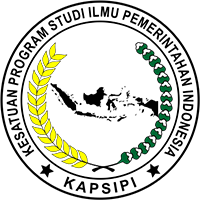The Zero Waste System Waste Management Policy Innovation in West Nusa Tenggara the Pentahelix Model
DOI:
https://doi.org/10.35967/njip.v21i1.335Keywords:
Innovation, Policy, Zero Waste, PentahelixAbstract
This research was conducted in West Nusa Tenggara Province, aiming to find out the innovation of zero waste program policies. This study uses a descriptive method with a qualitative approach. The sources of data in this study are primary data obtained directly from the government, private sector, university, community and media. In addition, secondary data is also supported, which is data obtained from documents, publications, or literature related to Zero Waste Policy Innovations. The results of this study indicate that the zero waste program policy has generally been functioning and realized. Supporting factors in this zero waste program policy are government support for the program, adequate financial resources and the availability of human resources. While the inhibiting factor in this zero waste program policy is the lack awareness of the community in practice people tend to pay less attention to the problem of landfilling waste that occurs, especially the use of single-use materials that are very much in our environment. To overcome these obstacles, the Environment and Forestry Office of the Province of NTB took steps, namely increasing socialization and collaborating with other parties such as the private sector, media, academics and the community itself. The pentahelix model in the development of a zero waste program looks at the parameters of the involvement of various actors to work together in optimizing the zero waste program. the importance of collaboration with the Pentahelix Model, with the involvement of academia, the private sector, the community, government and the media is very important to support the zero waste program in the future, but so far this collaboration is still not optimal, measured from the interdependence between actors, constructive unification of thoughts, decisions together, and joint responsibility, only certain parties are involved in the collaboration, so it is important that there is a special agreement or regulation to regulate these components to be able to cooperate officially in seeking collaboration with the Pentahelix Model in the zero waste program.
Downloads
References
Agung, L. (2018). Peran Manusia Sebagai Khalifah Allah di Muka Bumi Perspektif Ekologis dalam Ajaran Islam A . Pendahuluan umat didunia , khususnya masyarakat Indonesia . Saat ini , Islam. Jurnal Penelitian.
Ann Gibbsons. (2009). Africans’ deep genetic roots reveal their evolutionary story. In Science. https://doi.org/10.1126/science.324_575
Artiningsih, N. K. A. (2012). Peran Serta Masyarakat dalam Pengelolaan Sampah Rumah Tangga (Studi Kasus di Sampangan dan Jomblang, Kota Semarang). In Serat Acitya.
Crofts, K., & Bisman, J. (2010). Interrogating accountability: An illustration of the use of Leximancer software for qualitative data analysis. Qualitative Research in Accounting & Management. https://doi.org/10.1108/11766091011050859
Hamrun, H., Harakan, A., Prianto, A. L., & Khaerah, N. (2020). Strategi Pemerintah Daerah Dalam Pengembangan Pelayanan Berbasis E-Government Di Kabupaten Muna. Nakhoda: Jurnal Ilmu Pemerintahan. https://doi.org/10.35967/jipn.v18i2.7808
Helsloot, I., & Ruitenberg, A. (2004). Citizen response to disasters: A survey of literature and some practical implications. Journal of Contingencies and Crisis Management. https://doi.org/10.1111/j.0966-0879.2004.00440.x
Mulyanto, D. H. (2020). The Quality In Electronic Services Jogja City Government: In Case E-KTP. Nakhoda: Jurnal Ilmu Pemerintahan. https://doi.org/10.35967/jipn.v18i2.7814
Nugraheni, N. A. (2021). 5 Negara ini Penyumbang Sampah Plastik Terbesar di Dunia, Indonesia Urutan Ke-3. Tempo.Co.
Pratama Inka, N. H. A. Z. I. (2021). Manajemen bencana non alam COVID-19 dilihat dari kepemimpinan quadruple helix di Kota Mataram. Jurnal Ilmiah Tata Sejuta STIA Mataram.
Putri, D. A. P. A. G., & Permana, G. P. L. (2021). Pemberdayaan Masyarakat melalui Pengelolaan Sampah Berbasis Ecovillage di Desa Penebel, Kecamatan Penebel, Kabupaten Tabanan, Bali. Journal of Community Development & Empowerment. https://doi.org/10.29303/jcommdev.v1i2.13
Rahman, K. (2017). Pelayanan Pemerintahan yang Bertanggung Jawab. Jurnal Ilmu Pemerintahan Nakhoda. https://doi.org/10.35967/jipn.v16i28.5823
Saksono, H. (2020). Innovation Hub: Media Kolaborasi Menuju Pemerintahan Daerah Inovatif. Nakhoda: Jurnal Ilmu Pemerintahan. https://doi.org/10.35967/jipn.v19i1.7854
Setyanti, S. W. L. H. (2018). Peran Quadruple Helix Untuk Meningkatkan Kreativitas dan Kinerja Inovasi Industri Kreatif Indonesia. Seminar Nasional Manajemen Dan Bisnis Ke-3.
Subarkah, A. R. (2018). Peran ECPAT dalam Menangani Child Sex Tourism di Indonesia (Studi Kasus: Bali). TRANSBORDERS: International Relations Journal.
Sulikah, S., Mindarti, L. I., Sentanu, I. G. E. P. S., & Hidayah, K. (2021). Pendekatan Kolaborasi Quadruple Helix dalam Peningkatan Ekonomi Daerah. Jurnal Borneo Administrator. https://doi.org/10.24258/jba.v17i1.714
Takbiran, H. H. T. (2020). Bank Sampah Sebagai Alternatif Strategi Pengelolaan Sampah Menuju Sentul City Zero Emission Waste Kabupaten Bogor. IJEEM - Indonesian Journal of Environmental Education and Management. https://doi.org/10.21009/ijeem.052.05
Taufiq, M., Suhirman, S., Sofhani, T. F., & Kombaitan, B. (2020). Kajian CSR melalui Sudut Pandang Perencanaan Transaktif: Studi Kasus Perencanaan CSR di Indonesia. Indonesian journal of accounting and governance. https://doi.org/10.36766/ijag.v3i2.46
Vebrianto, A. (2016). Implementasi Kebijakan Penatausahaan Barang/Aset Negara Pada Balai Penelitian Dan Pengembangan Pengendalian Penyakit Bersumber Binatang Donggala. Katalogis.
Wahjusaputri, S., Fitriani, S., Dipenogoro, A., & N. Indah, T. (2018). Model Pengembangan Ekonomi Kreatif Berbasis Triple Helix Bagi UKM Di Provinsi Jawa Barat. Procedia - Social and Behavioral Sciences.
Wahyuning, S., Sunarto, & Wiryanto. (2017). Pengelolaan Sampah Berbasis Peran Serta Masyarakat di Desa Kalibeber, Kecamatan Mojotengah, Kabupaten Wonosobo. Jurnal Uns Surakarta.
Wijaya, K., & Wibowo, H. (2016). Partisipasi Masyarakat dalam Mengelola Limbah Industri Di Permukiman Perkotaan (Studi Kasus: Kawasan Wisata Belanja Tekstil Cigondewah Kota Bandung). Q-JOURNAL TEDC.
Winahyu, D., Hartoyo, S., & Syaukat, Y. (2019). Strategi Pengelolaan Sampah pada Tempat Pembuangan Akhir Bantargebang, Bekasi. Jurnal Manajemen Pembangunan Daerah. https://doi.org/10.29244/jurnal_mpd.v5i2.24626
Downloads
Published
How to Cite
Issue
Section
License
Copyright (c) 2022 Ilham Zitri, Yudhi Lestanata, Darmansyah, Amil, Rizal Umami

This work is licensed under a Creative Commons Attribution-NonCommercial-ShareAlike 4.0 International License.





